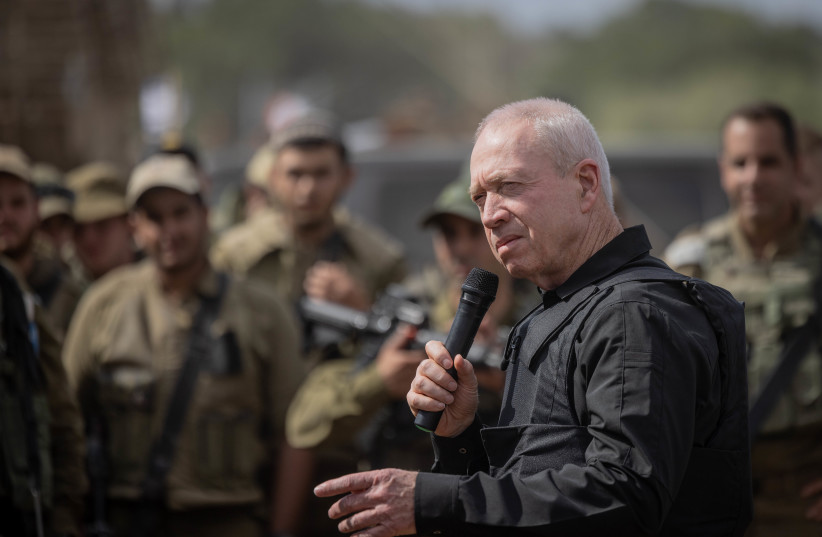One of the deadliest aspects of a major and confusing national security crisis is that it blindsides most people when other potential crises emerge and are underestimated in the distraction of the moment.
Though Israel has been worried about an Iranian nuclear weapon since the 1990s, it and the world may currently be blind to an Iranian nuclear sneakout (as opposed to a public and open “breakout.”)
Jerusalem became far more seriously worried about a nuclear weapon after Iran hiked up its uranium enrichment to 60% in 2021.
In February of this year, top US Pentagon official Colin Kahl told the US Congress that the Islamic Republic could enrich enough fissile material, 90% weaponized uranium, for a nuclear bomb in only 12 days.
In May, Defense Minister Yoav Gallant said that Tehran could in a relatively short time enrich its 60% and 20% uranium stock up to enough weaponized material for around five nuclear weapons.

Israel's greatest tragedy to date
Hamas’s massive invasion of the South on October 7 was the greatest tragedy Israel has faced in decades. But Hamas is not and has never been an existential threat.
Even Hezbollah in the North, with more than 150,000 rockets, a much greater strategic threat than Hamas to Israel’s entire home front, is not an existential threat.
Only Iran and its nuclear weapons program fit this category.
True, there are estimates that it would take Iran anywhere from six months to two years to resolve various special nuclear weapons group detonation and delivery issues. But what if Iran is working on these issues clandestinely?
Isn’t it strange that the IAEA, once an organization which was thought of as too soft on Iran, is the only group to publicly be discussing this since the war started?
On October 16, around 10 days into the war, Grossi sounded the alarm at a US State Department conference, saying the world must ensure the Iran nuclear standoff does not become like the North Korea case, where nuclear inspectors were expelled before it carried out nuclear weapons testing.
“We have to deploy every effort to prevent this problem, this current debate on what is happening and what can be done in Iran [from] becoming a failure on the part of the international community to prevent a country that has capabilities which could potentially lead to the development of nuclear weapons from doing it,” said Grossi.
He added, “We saw the failure of this type in the Democratic People’s Republic of Korea, North Korea.”
SOME ESTIMATE that North Korea may now have dozens of nuclear weapons. Whether or not that is true, the country now has an arsenal and can get away with a variety of dangerous actions because no one now will dare to attack it.
Putting aside the even worse nightmare where Iran would obtain and use a nuclear weapon, simply imagine that it had a nuclear weapon which it had tested, and how much that would paralyze the world’s ability to roll back its global terror.
Why not quietly sneak out toward a nuclear weapon now?
Just before the war, The Jerusalem Post learned from top Israeli defense sources that Jerusalem’s estimate is that Iran has still not made the decision to go for a nuclear weapon and has still not shorted the weapons group issues.
But Israeli intelligence was also sure that Hamas was deterred from starting a war, and was utterly blindsided by October 7.
Yes, that was more the fault of the Shin Bet and IDF intelligence, and Iran is more in the hands of the Mossad.
And yes, Israeli intelligence is still among the best or the best in the business. But we just saw that even the best can be blindsided by getting used to certain patterns (or fake patterns to distract) and the passage of time, which induces apathy and carelessness.
The only piece of good news regarding Iran are the vast US military assets currently added to the region.
In the event of any conflict with either Hezbollah or Iran, or both, America clearly has Israel’s back and this would change the entire shape of any such conflict.
The US already shot down some aerial threats to Israel on their way from Yemen and could do a lot more.
However, even these military facts are focused on conventional military threats, not nuclear.
It is unclear how much, if at all, these vast capabilities could help the US better detect Iran sneaking out on some of the nuclear weapons issues in a country the size of Germany, France, and Italy combined, with a population of over 80 million.
And the concern that the Mossad and IDF intelligence could be misinterpreting signs is not just theoretical.
In January, the IAEA detected Iran enriching a tiny amount of uranium to 83.7%.
Ultimately, both the international community and Israeli intelligence, the Post was told, concluded that this incident was in fact a fluke error and not a sign of Iran trying to truly jump to the 90% weaponized level.
What if that conclusion was wrong? What if Iran has been crossing certain thresholds and even Israel’s remarkable intelligence is more blind now on the Iran nuclear front, while focused on Hamas and Hezbollah, than it has been in decades.
The Post also understands that the judicial overhaul debate not only took a toll on the IDF, but also on the Mossad and Shin Bet.
There are no easy answers to these questions, but Israel cannot afford to fall asleep on the Iran nuclear front, no matter how busy it is in the ongoing war with Hamas and the ongoing conflict with Hezbollah.
